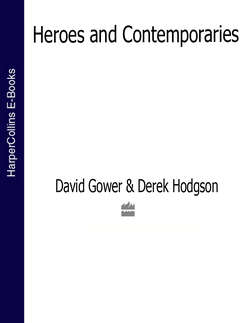Читать книгу Heroes and Contemporaries (Text Only) - David Gower - Страница 5
ОглавлениеFOREWORD
It seems almost a little late to be writing about heroes. To me, heroes were the people I watched in my schooldays, when the curtains were drawn and the television switched on for the start of a Test match; and the players involved appeared far more mystical than they ever could after my own adoption by the game that I had admired from afar for so long. Sobers was an undoubted hero, as he was no doubt to thousands of other followers – how could anyone with his natural ability and grace not be? Another who easily qualified and who still seems to be playing well in South Africa, was Graeme Pollock, whom I saw score a hundred at Trent Bridge against England in the first Test match my parents ever took me to see. Similarly, John Edrich, when he scored three hundred against the New Zealanders, became another hero.
To me, then, these people, apart from coincidentally all being left-handed batsmen, were extraordinary and worthy of idolization, and that is how they mostly remain. Some of the mystique disappeared when I started to play first-class cricket amongst them; though I shall never play against Sobers or Pollock unless, in the latter’s case, the situation in South Africa changes rather quickly. I did just manage to overlap the start of my career with the finish of John Edrich’s. My first captain was Ray Illingworth, whose presence when I first reported to Leicestershire overawed me.
What I have gained, therefore, is an understanding of the characters involved, so that the people I have chosen to write about in this book have no lesser ability than my boyhood idols and are thus heroes of the same standing but without the mystique.
Some of them I have played against often; some I have played little against but those have made an impression on me in other ways. It follows that some of these players I do know very well, while with others it has been no more than the odd conversation and casual acquaintance. I can call some of these names close personal friends, while others are virtually strangers.
It would have been easier, I admit, to choose to write only about those I know very well, but that would have meant the omission of several very famous players. I wanted to include players from all over the world who reflect the general standard of the game today. In doing so I apologize to those many players, friends of mine and others, who no doubt feel that they have done enough to merit a mention.
Test status was the qualification for inclusion here in almost every case and the one player who hasn’t played Test cricket among my Heroes and Contemporaries has been prevented from doing so only by politics. He has long had the ability to play Test cricket and he certainly qualifies as a hero.
I have tried to make this book about men rather than about cricketers. Fascinating as the game’s statistics can be and an endless source of trivia for quizmasters and the like, they are far from being the best judgement on a player and give no insight into a man’s character or circumstances. Only, for instance, in the last few years, as biographers have burrowed beneath Edwardian records, have some of the great men of the Golden Age appeared as their contemporaries knew them.
The likes of Boycott and Botham will live forever in the record books, and I am by no means the first observer to try to unravel and explain their complex personalities. I have had the advantage of seeing them in the privacy of the dressing-room, and hope not to have abused that privilege but instead to have used it to good purpose.
The style is, I hope, relaxed and readable. I hope too that the book includes what may be a few new stories about some of your favourite cricketers, and that your enjoyment of them matches the time spent in composing what follows.
